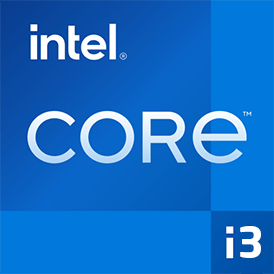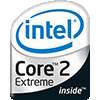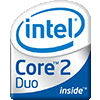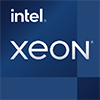
Intel Core i3-4005U Benchmark, test e specifiche
Ultimo aggiornamento:
Il Intel Core i3-4005U ha 2 core con 4 thread ed è basato sul 4. Gene della serie Intel Core i3. Il processore utilizza una scheda madre con il socket BGA 1168 ed è stato rilasciato in Q3/2013. Intel Core i3-4005U ottiene 416 punti nel benchmark single-core di Geekbench 5. Nel benchmark multi-core di Geekbench 5, il risultato è 956 punti.

| Cognome: | Intel Core i3-4005U |
|---|---|
| Famiglia: | Intel Core i3 (205) |
| Gruppo CPU: | Intel Core i 4000U (26) |
| Architettura : | Haswell U |
| Segmento: | Mobile |
| Generazione: | 4 |
| Predecessore: | -- |
| Successore: | Intel Core i3-5005U |
CPU Cores e frequenza di base
Intel Core i3-4005U ha 2 core CPU e può calcolare 4 thread in parallelo. La frequenza di clock di Intel Core i3-4005U è 1,70 GHz. Il numero di core della CPU influisce notevolmente sulla velocità del processore ed è un importante indicatore delle prestazioni.
| CPU Cores / Threads: | 2 / 4 |
|---|---|
| Architettura principale: | normal |
| Cores: | 2x |
| Hyperthreading / SMT: | Si |
|---|---|
| Overclocking: | No |
| Frequenza: | 1,70 GHz |
| Turbo Frequenza (1 Core ): | -- |
| Turbo Frequenza (2 Cores): | -- |
Grafica interna
Intel Core i3-4005U ha una grafica integrata, chiamata iGPU in breve. Nello specifico, Intel Core i3-4005U utilizza Intel HD Graphics 4400, che ha 160 texture shader e 20 unità di esecuzione. L'iGPU utilizza la memoria principale del sistema come memoria grafica e si trova sul die del processore.
| nome GPU: | Intel HD Graphics 4400 |
|---|---|
| Frequenza GPU : | 0,20 GHz |
| GPU (Turbo ): | 0,95 GHz |
| Unità di esecuzione: | 20 |
| Shader: | 160 |
| Hardware Raytracing: | No |
| Data di lancio : | Q2/2013 |
| Max. visualizzazioni: | 3 |
|---|---|
| Generation: | 7.5 |
| Direct X: | 11.1 |
| Tecnologia : | 22 nm |
| Max. GPU Memoria: | 2 GB |
| Frame Generation: | No |
Hardware codec support
Un codec fotografico o video accelerato nell'hardware può accelerare notevolmente la velocità di lavoro di un processore e prolungare la durata della batteria di notebook o smartphone durante la riproduzione di video.
| h265 / HEVC (8 bit): | No |
|---|---|
| h265 / HEVC (10 bit): | No |
| h264: | Decodificare / Codificare |
| VP8: | No |
| VP9: | No |
| AV1: | No |
|---|---|
| AVC: | Decodificare / Codificare |
| VC-1: | Decodificare |
| JPEG: | Decodificare |
Memoria & PCIeIl processore può utilizzare fino a 16 GB memoria in 2 (Dual Channel) canali di memoria. La larghezza di banda massima della memoria è 25,6 GB/s. Il tipo di memoria e la quantità di memoria possono influire notevolmente sulla velocità del sistema. |
|
| Tipo di memoria : | Banda di memoria: |
|---|---|
| DDR3-1600 | 25,6 GB/s |
| Max. Memoria: | 16 GB |
| Canali di memoria : | 2 (Dual Channel) |
| ECC: | No |
| PCIe: | 2.0 x 10 |
| PCIe Larghezza di banda: | 5,0 GB/s |
Gestione termicaLa potenza di progettazione termica (TDP in breve) del processore è 15 W. Il TDP specifica la soluzione di raffreddamento necessaria per raffreddare sufficientemente il processore. Il TDP di solito dà un'idea approssimativa dell'effettivo consumo energetico della CPU. |
|
|---|---|
| TDP (PL1 / PBP): | 15 W |
| TDP (PL2): | -- |
| TDP up: | -- |
| TDP down: | -- |
| Tjunction max.: | -- |
Dettagli tecnici
Il Intel Core i3-4005U è realizzato in 22 nm. Più piccolo è il processo di produzione di una CPU, più è moderna ed efficiente dal punto di vista energetico. Nel complesso, il processore ha 3,00 MB cache. Una cache di grandi dimensioni può accelerare notevolmente la velocità del processore in alcuni casi, ad esempio nei giochi.
| Tecnologia : | 22 nm |
|---|---|
| Design a chip: | Monolitico |
| Presa: | BGA 1168 |
| L2-Cache: | -- |
| L3-Cache: | 3,00 MB |
| AES-NI: | Si |
| Sistemi operativi: | Windows 10, Linux |
| Virtualizzazione: | VT-x, VT-x EPT, VT-d |
|---|---|
| Set di istruzioni (ISA): | x86-64 (64 bit) |
| Estensioni ISA: | SSE4.1, SSE4.2, AVX2 |
| Data di lancio : | Q3/2013 |
| Prezzo di rilascio: | -- |
| Numero di parte: | -- |
| Documenti: | Scheda tecnica |
Valuta questo processore
Risultati di benchmark

I risultati del benchmark per Intel Core i3-4005U sono stati attentamente controllati da noi. Pubblichiamo solo risultati di benchmark che sono stati creati da noi o che sono stati inviati da un visitatore e poi controllati da un membro del team. Tutti i risultati sono basati e rispettano le nostre linee guida di benchmark.
Schermate:
Schermate:
Geekbench 5, 64bit (Single-Core)
Geekbench 5 è un benchmark multi-piattaforma che usa in modo intensivo la memoria del sistema.Il test single-core utilizza solo un nucleo elaborativo della CPU. A tal fine, il numero di nuclei elaborativi o la capacità di hyperthreading non sono rilevanti.

|
Intel Core i7-680UM
2C 4T @ 2,53 GHz |
||

|
Intel Core2 Extreme X6800
2C 2T @ 2,93 GHz |
||

|
Intel Core 2 Extreme QX6850
4C 4T @ 3,00 GHz |
||
|
|
Intel Core i3-4005U
2C 4T @ 1,70 GHz |
||

|
AMD Athlon II X2 255
2C 2T @ 3,10 GHz |
||

|
Intel Core i3-4010U
2C 4T @ 1,70 GHz |
||

|
Intel Core2 Duo E8200
2C 2T @ 2,66 GHz |
||
Geekbench 5, 64bit (Multi-Core)
Geekbench 5 è un benchmark multi-piattaforma che usa in modo intensivo la memoria del sistema.Il test multi-core coinvolge tutti i nuclei elaborativi della CPU e si avvale del hyperthreading.

|
Intel Core i3-2328M
2C 4T @ 2,20 GHz |
||

|
Intel Core i3-2330E
2C 4T @ 2,20 GHz |
||

|
Intel Core i3-2330M
2C 4T @ 2,20 GHz |
||
|
|
Intel Core i3-4005U
2C 4T @ 1,70 GHz |
||

|
Intel Core i5-4202Y
2C 4T @ 1,60 GHz |
||

|
Intel Core i3-4010U
2C 4T @ 1,70 GHz |
||

|
MediaTek Helio P35
8C 8T @ 2,30 GHz |
||
Geekbench 6 (Single-Core)
Geekbench 6 è un punto di riferimento per computer, notebook e smartphone moderni. Ciò che è nuovo è un utilizzo ottimizzato delle architetture CPU più recenti, ad esempio basate sul concetto big.LITTLE e combinando core CPU di diverse dimensioni. Il benchmark single-core valuta solo le prestazioni del core della CPU più veloce, il numero di core della CPU in un processore è irrilevante qui.

|
Intel Core i5-2430M
2C 4T @ 3,00 GHz |
||

|
Intel Core i5-2435M
2C 4T @ 3,00 GHz |
||

|
Intel Pentium J6426
4C 4T @ 3,00 GHz |
||
|
|
Intel Core i3-4005U
2C 4T @ 1,70 GHz |
||

|
Intel Core i3-3210
2C 4T @ 3,20 GHz |
||

|
Intel Core i3-4010U
2C 4T @ 1,70 GHz |
||

|
Intel Core i7-3517U
2C 4T @ 3,00 GHz |
||
Geekbench 6 (Multi-Core)
Geekbench 6 è un punto di riferimento per computer, notebook e smartphone moderni. Ciò che è nuovo è un utilizzo ottimizzato delle architetture CPU più recenti, ad esempio basate sul concetto big.LITTLE e combinando core CPU di diverse dimensioni. Il benchmark multi-core valuta le prestazioni di tutti i core della CPU del processore. I miglioramenti del thread virtuale come AMD SMT o l'Hyper-Threading di Intel hanno un impatto positivo sul risultato del benchmark.

|
Samsung Exynos 9611
8C 8T @ 2,30 GHz |
||

|
Intel Celeron G4900
2C 2T @ 3,10 GHz |
||

|
Intel Core i3-3210
2C 4T @ 3,20 GHz |
||
|
|
Intel Core i3-4005U
2C 4T @ 1,70 GHz |
||

|
Intel Core i3-4010U
2C 4T @ 1,70 GHz |
||

|
Intel Core i5-3210M
2C 4T @ 3,10 GHz |
||

|
Intel Core i5-3437U
2C 4T @ 1,90 GHz |
||
Cinebench R20 (Single-Core)
Cinebench R20 è il successore di Cinebench R15 ed è anch'esso basato su Cinema 4D. Cinema 4D è un software usato a livello mondiale per creare forme in 3D. Il test single-core utilizza solo un nucleo elaborativo della CPU. A tal fine, il numero di nuclei elaborativi o la capacità di hyperthreading non sono rilevanti.

|
AMD Phenom II X3 720
3C 3T @ 2,80 GHz |
||

|
Intel Core m5-6Y57
2C 4T @ 2,80 GHz |
||

|
AMD Athlon II X4 645
4C 4T @ 3,10 GHz |
||
|
|
Intel Core i3-4005U
2C 4T @ 1,70 GHz |
||

|
Intel Celeron N4100
4C 4T @ 2,40 GHz |
||

|
AMD Athlon II X4 640
4C 4T @ 3,00 GHz |
||

|
Intel Xeon E7-8870 v2
15C 30T @ 2,90 GHz |
||
Cinebench R20 (Multi-Core)
Cinebench R20 è il successore di Cinebench R15 ed è anch'esso basato su Cinema 4D. Cinema 4D è un software usato a livello mondiale per creare forme in 3D. Il test multi-core coinvolge tutti i nuclei elaborativi della CPU e si avvale del hyperthreading.

|
Intel Core m5-6Y57
2C 4T @ 2,20 GHz |
||

|
Intel Core m3-8100Y
2C 4T @ 1,10 GHz |
||

|
Intel Celeron N4120
4C 4T @ 2,50 GHz |
||
|
|
Intel Core i3-4005U
2C 4T @ 1,70 GHz |
||

|
Intel Celeron N4100
4C 4T @ 2,40 GHz |
||

|
Intel Core i7-4510U
2C 4T @ 2,70 GHz |
||

|
Intel Core i3-2330M
2C 4T @ 2,20 GHz |
||
iGPU - Prestazioni FP32 (GFLOPS a precisione singola)
Le prestazioni di calcolo teoriche dell'unità grafica interna del processore con precisione semplice (32 bit) in GFLOPS. GFLOPS indica quanti miliardi di operazioni in virgola mobile che l'iPPU può eseguire al secondo.

|
AMD A6-6400K
AMD Radeon HD 8470D @ 0,80 GHz |
||

|
AMD A6-6420K
AMD Radeon HD 8470D @ 0,80 GHz |
||

|
AMD A9-9410
AMD Radeon R5 (Stoney Ridge) @ 0,80 GHz |
||
|
|
Intel Core i3-4005U
Intel HD Graphics 4400 @ 0,95 GHz |
||

|
Intel Core i3-4025U
Intel HD Graphics 4400 @ 0,95 GHz |
||

|
Intel Core i7-3770S
Intel HD Graphics 4000 @ 1,15 GHz |
||

|
Intel Core i7-3632QM
Intel HD Graphics 4000 @ 1,15 GHz |
||
Risultati stimati da PassMark CPU Mark
Alcune delle CPU elencate di seguito sono stati sottoposti a benchmarking da CPU-monkey. Tuttavia, la maggior parte delle CPU non sono state testate e i risultati sono stati stimati utilizzando una formula segreta di proprietà di CPU-monkey. Come tali, essi non riflettono con precisione i valori attuali di Passmark CPU Mark e non sono stati approvati da PAssMark Software Pty Ltd.

|
AMD A6-7000
2C 2T @ 3,00 GHz |
||

|
AMD A6-5200
4C 4T @ 2,80 GHz |
||

|
MediaTek Helio P25
8C 8T @ 2,60 GHz |
||
|
|
Intel Core i3-4005U
2C 4T @ 1,70 GHz |
||

|
Intel Core i3-560
2C 4T @ 3,33 GHz |
||

|
Intel Core i3-4010U
2C 4T @ 1,70 GHz |
||

|
AMD A6-1450
4C 4T @ 1,40 GHz |
||
CPU-Z Benchmark 17 (Single-Core)
Il benchmark CPU-Z misura le prestazioni di un processore misurando il tempo impiegato dal sistema per completare tutti i calcoli del benchmark. Più velocemente viene completato il benchmark, maggiore è il punteggio.

|
Intel Core i5-4200U
2C 4T @ 2,30 GHz |
||

|
Intel Core i3-3110M
2C 4T @ 2,40 GHz |
||

|
Intel Core i3-5005U
2C 4T @ 2,00 GHz |
||

|
Intel Core i3-6006U
2C 4T @ 2,00 GHz |
||

|
AMD Phenom II X4 955
4C 4T @ 3,20 GHz |
||
|
|
Intel Core i3-4005U
2C 4T @ 1,70 GHz |
||

|
Intel Core m3-7Y30
2C 4T @ 2,00 GHz |
||
CPU-Z Benchmark 17 (Multi-Core)
Il benchmark CPU-Z misura le prestazioni di un processore misurando il tempo impiegato dal sistema per completare tutti i calcoli del benchmark. Più velocemente viene completato il benchmark, maggiore è il punteggio.

|
Intel Pentium E6500
2C 2T @ 2,93 GHz |
||

|
Intel Core2 Duo E8400
2C 2T @ 3,00 GHz |
||

|
Intel Pentium 2020M
2C 2T @ 2,40 GHz |
||
|
|
Intel Core i3-4005U
2C 4T @ 1,70 GHz |
||

|
AMD 3020e
2C 4T @ 1,20 GHz |
||

|
Intel Core i3-4010U
2C 4T @ 1,70 GHz |
||

|
Intel Core2 Duo E7400
2C 2T @ 2,80 GHz |
||
Cinebench R15 (Single-Core)
Cinebench R15 è il successore di Cinebench 11.5 ed è anch'esso basato su Cinema 4D. Cinema 4D è un software usato a livello mondiale per creare forme in 3D. Il test single-core utilizza solo un nucleo elaborativo della CPU. A tal fine, il numero di nuclei elaborativi o la capacità di hyperthreading non sono rilevanti.

|
AMD Phenom II X3 710
3C 3T @ 2,60 GHz |
||

|
AMD Phenom II X4 810
4C 4T @ 2,60 GHz |
||

|
AMD Phenom II X4 910
4C 4T @ 2,60 GHz |
||
|
|
Intel Core i3-4005U
2C 4T @ 1,70 GHz |
||

|
AMD A10-6700
4C 4T @ 4,30 GHz |
||

|
AMD Athlon II X4 630
4C 4T @ 2,80 GHz |
||

|
Intel Pentium 3556U
2C 2T @ 1,70 GHz |
||
Cinebench R15 (Multi-Core)
Cinebench R15 è il successore di Cinebench 11.5 ed è anch'esso basato su Cinema 4D. Cinema 4D è un software usato a livello mondiale per creare forme in 3D. Il test multi-core coinvolge tutti i nuclei elaborativi della CPU e si avvale del hyperthreading.

|
AMD Phenom II X2 511
2C 2T @ 3,40 GHz |
||

|
AMD Phenom II X2 565
2C 2T @ 3,40 GHz |
||

|
AMD Phenom II X2 B59
2C 2T @ 3,40 GHz |
||
|
|
Intel Core i3-4005U
2C 4T @ 1,70 GHz |
||

|
AMD A8-7200P
4C 4T @ 2,80 GHz |
||

|
Intel Core i3-4010U
2C 4T @ 1,70 GHz |
||

|
Intel Celeron G1820T
2C 2T @ 2,40 GHz |
||
Benchmarks

Geekbench 5 (SC)
2.488 inserimenti
2.488 inserimenti

Geekbench 5 (MC)
2.461 inserimenti
2.461 inserimenti

Geekbench 6 (SC)
1.754 inserimenti
1.754 inserimenti

Geekbench 6 (MC)
1.702 inserimenti
1.702 inserimenti

Cinebench R20 (SC)
656 inserimenti
656 inserimenti

Cinebench R20 (MC)
604 inserimenti
604 inserimenti

FP32 SP (iGPU)
2.026 inserimenti
2.026 inserimenti

PassMark CPU-Mark
2.391 inserimenti
2.391 inserimenti

CPU-Z Benchmark 17 (SC)
231 inserimenti
231 inserimenti

CPU-Z Benchmark 17 (MC)
733 inserimenti
733 inserimenti

Cinebench R15 (SC)
1.106 inserimenti
1.106 inserimenti

Cinebench R15 (MC)
1.101 inserimenti
1.101 inserimenti

Geekbench 3 (SC)
942 inserimenti
942 inserimenti

Geekbench 3 (MC)
938 inserimenti
938 inserimenti

Cinebench R11.5 (SC)
825 inserimenti
825 inserimenti

Cinebench R11.5 (MC)
836 inserimenti
836 inserimenti
Confronti più popolari
Torna all'indice




